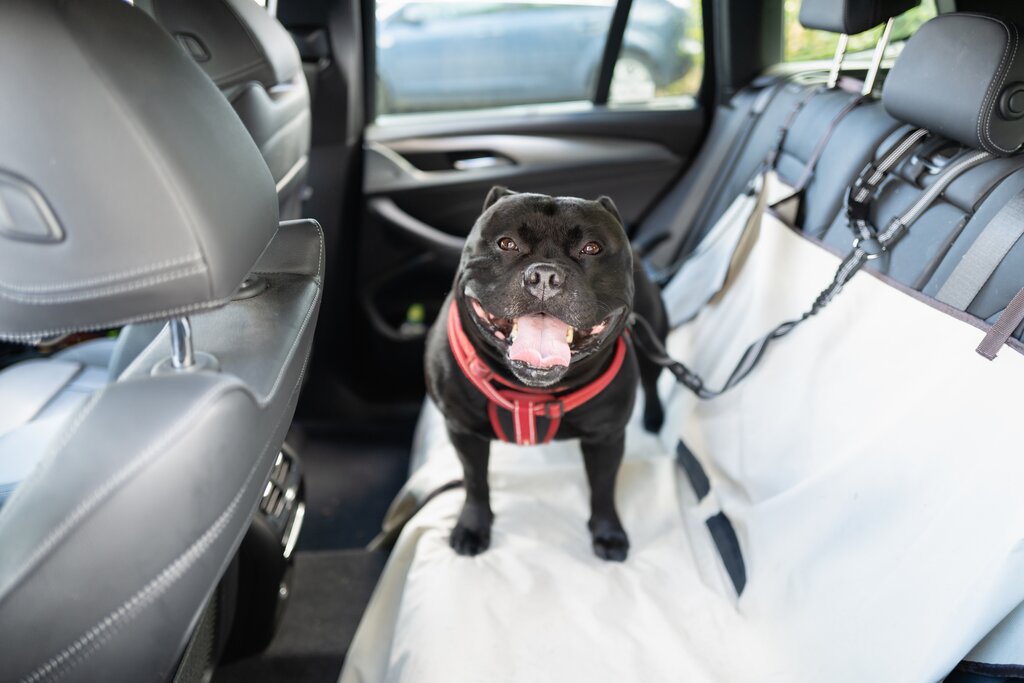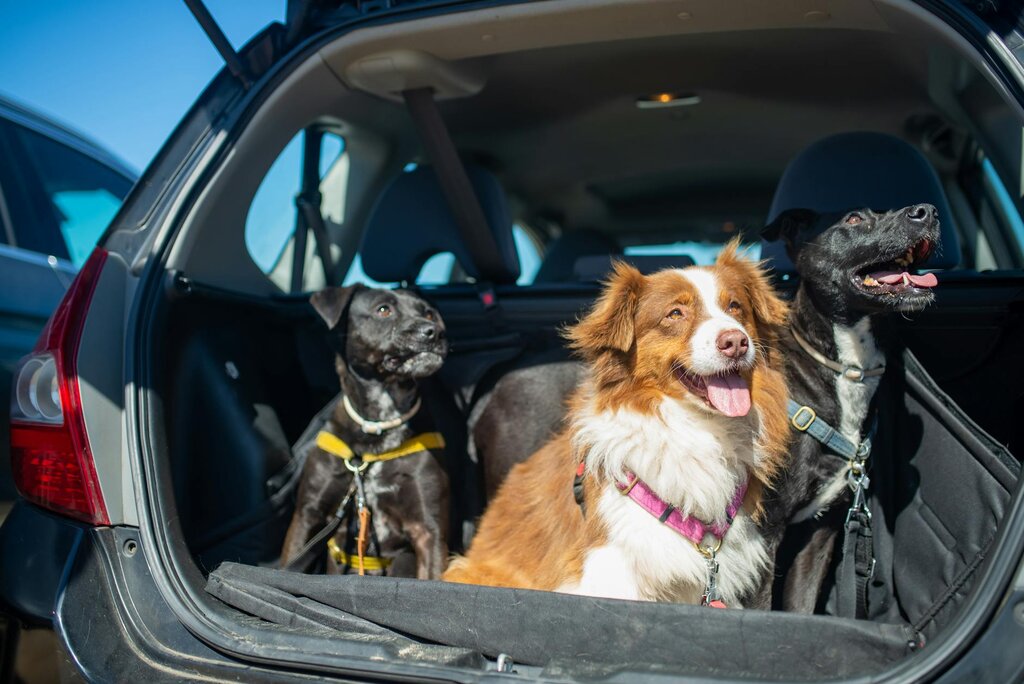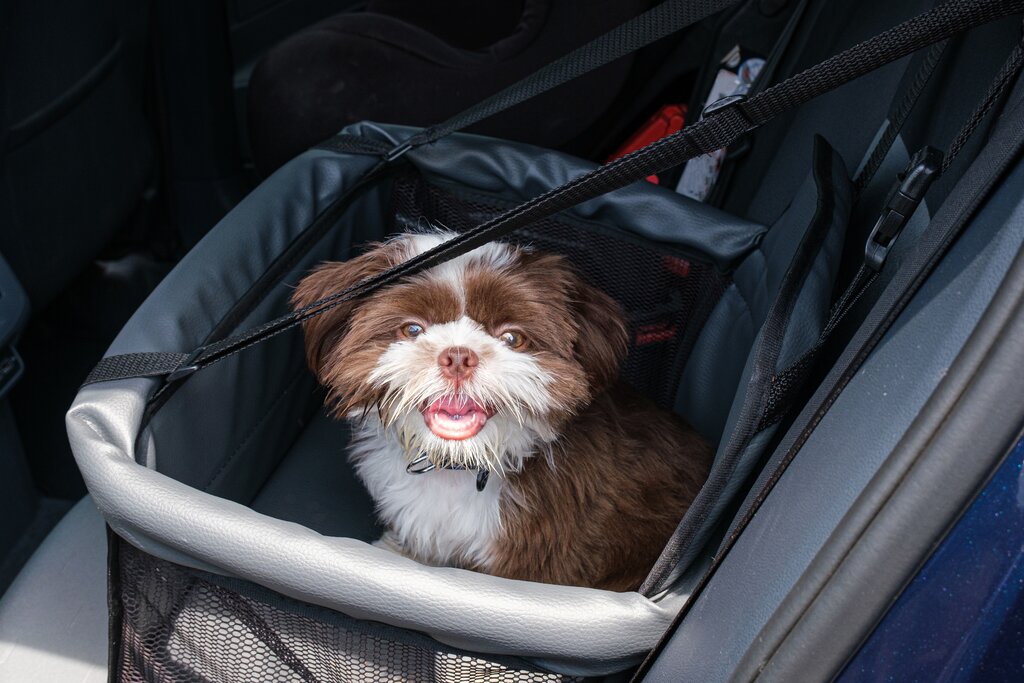Last Updated: 10/06/2025
How To Cure Car Sickness in Dogs
Is your dog anxious in the car or suffers from motion sickness? Find out how to alleviate it.
Author: Dr Carla Paszkowski BVSc (Hons)
Reading Time: 20 minutes - medium read
Last Updated: 10/06/2025
Is your dog anxious in the car or suffers from motion sickness? Find out how to alleviate it.
Author: Dr Carla Paszkowski BVSc (Hons)
Reading Time: 20 minutes - medium read
Does your pup suffer from motion sickness? As fun as a road trip with your pup can be, nobody enjoys cleaning dog vomit off the back seat.
Or perhaps your dog suffers from car anxiety, and is exceedingly restless and stressed every time you take them out for a drive.
Car sickness is very common in dogs, particularly puppies, and is closely linked with anxiety. This helpful guide should help you ease your pup's discomfort and get you on your way to calmer, cleaner car rides!

Dogs feel motion sickness, just like us. Motion sickness is caused by repeated physical movements in the inner ear that don't align with what the eyes are seeing. The inner ear sends different signals to your brain from the eyes, and these confusing messages create a neurological cascade that results in feelings of nausea.
You might be surprised to hear that car sickness in dogs is very common, particularly in puppies and young dogs. The structures inside the head that control balance are much smaller and less developed in puppies1 (this is also why human children suffer from motion sickness much worse than adults!). Some dog breeds also tend to be more prone to car sickness, including staffies and working breeds.
While car sickness can improve with age2, anxiety can exacerbate the problem in many cases. Some dogs simply dislike car trips altogether and it can be a significant source of anxiety for them, especially for those who experience motion sickness and nausea as puppies.
Signs of car sickness in dogs:
Car anxiety, on the other hand, can manifest in panting, pacing, crying, and restlessness.
Does nausea cause anxiety? Often anxious dogs exhibit their stressed behaviour because they feel nauseous - but sometimes they can make themselves so stressed that they become sick. With anxious dogs, it's hard to know whether the nausea is causing the anxiety, or whether the anxiety is causing the nausea.
Because car anxiety and car sickness are so often related, we have included tips for both cases in this guide. Luckily there are a few easy ways to get your pup the relief they deserve. Hopefully you'll be able to enjoy some vomit-free trips in no time at all!
You should seek veterinary advice if:
Ultimately, car sickness and anxiety are certainly frustrating issues to deal with. But thankfully, there are so many ways to help get your dog the relief they deserve. With our helpful tips, we hope you and your pup will be enjoying some stress (and vomit!)-free car rides in no time!
Our experts continually monitor the health and wellness space and we update our articles when new information becomes available.
Veterinarian
Dr. Carla graduated from the University of Queensland in 2013 with a Bachelor of Veterinary Science and worked for a number of years in small animal clinics across South East Queensland. While Carla enjoys most facets of clinical veterinary work, she holds a special passion for feline medicine, pocket pets, and nutrition.

HomeoPet Travel Anxiety drops are a natural, fast-acting remedy designed to ease travel sickness and stress in pets. Whether your furry friend experiences nausea, drooling, panting, or restlessness during car rides, flights, or other travel situations, this gentle formula can help to promote a sense of calm. Made with homeopathic ingredients, it works to soothe motion-related discomfort without causing drowsiness, making it a great option for pets prone to travel-induced anxiety. Simply administer the drops before or during travel to help your pet feel more at ease, ensuring a smoother and more comfortable journey for both of you.
Research has shown that ginger may be effective in treating motion sickness in humans.4 Ginger can work wonders for queasy pups. Simply give a spoonful of ginger to your dog around 20-30 minutes prior to the car ride. For small breeds try a small teaspoon, and for larger dogs (staffies upwards) try a dessert spoon. Most people find this surprisingly effective. You can certainly try to administer the ginger straight into your dog's mouth, however you might find this a little tricky! Instead, most dogs will happily take fresh ginger if it has been concealed in a bit of wet dog food, or a tasty piece of meat. Wrapping a lump of ginger in turkey slice, chicken or wet food is an easy way to get them to accept it!
What kind of ginger is safe for dogs? Thankfully all types of ginger are safe for dogs (unlike garlic!). In general, we recommend finely chopped fresh ginger, or minced.
Have you ever noticed how car sickness in humans is improved if they sit in the front seat? This is because improved visibility and a forward-facing position helps stabilise the head and associated balance structures.
Dogs are no different. When you think about it, it's easy to appreciate how being stuck in the back of a car without a view outside can exacerbate motion sickness.
If possible, try to position your dog so they can see out a window. Opening a window to deliver fresh air can really help too.5 To help with visibility, you might like to prop your dog up with a car harness or seat, or try and crate train your puppy at an early age. If you don't have a dog travel crate, always be sure to keep them secure with a seatbelt-attaching harness. (In most states, this is a legal requirement!)

Now that we've addressed some helpful ways to stop your dog feeling car sick, let's delve into how to reduce travel anxiety. Remember, stress is often interlinked with car sickness; as your dog can become stressed because they feel nauseous, or nauseous because they feel stressed. (It's a bit of a viscious cycle!)
Barnes C, Hunter T, Ward E. "Motion Sickness in Dogs. VCA Animal Hospitals. (Online).
Park E. 1999. Motion Sickness. General Medical Officer (GMO) Manual: Clinical Section. Wilmette, Il: Brookside Press.
Benchaoui H, Siedek E, Puente-Redondo V, et al. 2007. Efficacy of maropitant for preventing vomiting associated with motion sickness in dogs. Vet Rec 2007;161:444-447.
Robinson N. 2004. Evidence-Based Practice of Acupuncture. Proc West Vet Conf 2004.
Conder G, Sedlacek H, Boucher J, Clemence R. 2008. Efficacy and safety of maropitant, a selective neurokinin 1 receptor antagonist, in two randomized clinical trials for prevention of vomiting due to motion sickness dogs. J Vet Pharmacol Ther 2008;31:528-532.